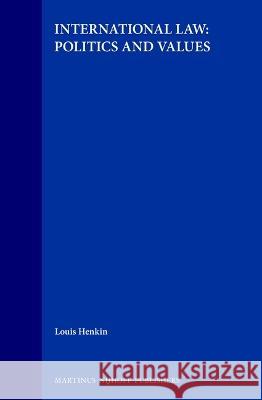International Law: Politics and Values » książka
International Law: Politics and Values
ISBN-13: 9780792329084 / Angielski / Twarda / 1995
This volume derives from a series of lectures delivered as the general course' at the Hague Academy of International law in July 1989. Like those lectures, this volume does not pretend to provide a complete treatise covering all international law. Rather, it offers a particular perspective on the principal subjects of traditional international law, elaborates new developments, and dares reexamine assumptions and premises. The book is built on three themes. The first addresses law as politics, and international law as the law of a political system, now comprised of more than 180 separate, independent states. The essential autonomy of states accounts for the political (as well as economic and cultural) heterogeneity in a pluralist and fragmented system, and international law as its common denominator of normative expression. A second theme explores change in international law as reflecting change in the values and purposes of the international political system. It traces the pursuit through law of the traditional ideal of the state system to secure every state's right to realize its own agenda through its own institutions, and the superimposed contemporary purpose to promote individual human rights and welfare in every society. The third theme perceives a movement in the law from conceptualism' to functionalism', from logical deduction out of abstract principles to pragmatic attention to practical needs and solutions to new and old human problems. Each of these themes dominates in several chapters but the other themes are not absent from any of them. Each will add a fresh perspective and contribute to understanding the nature and operation of international law in the international political system at the turn of a new century.











